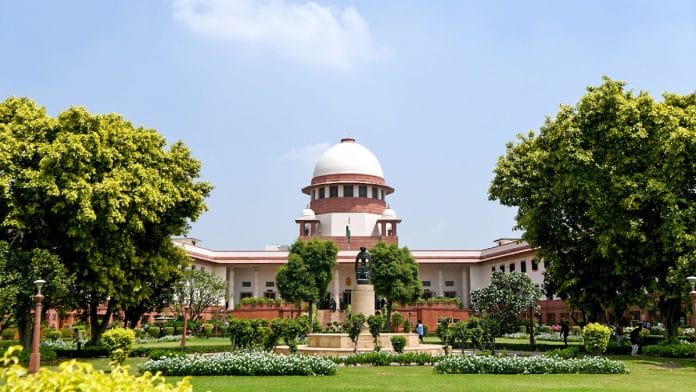New Delhi: The dissenting opinion in the case against the reservations for economically weaker Sections (EWS) Monday lamented the “othering” of the SCs, STs and OBCs by excluding them from the EWS quota and said that such an exercise heaps “fresh injustice based on past disability”.
The court, with a 3:2 majority, upheld the 103rd Constitution amendment, which provides for 10 per cent reservation to the EWS in education and government jobs.
Justice Dinesh Maheshwari, Justice Bela M. Trivedi and Justice J.B. Pardiwala delivered the majority judgment.
The minority opinion, authored by Justice Ravindra Bhat and supported by Chief Justice of India U.U. Lalit declared the quota “unconstitutional and void on the ground that they are violative of the basic structure of the Constitution”.
The 103rd Constitutional amendment enabled the State to provide for a maximum of 10 per cent reservation for the EWS “other than” the Scheduled Castes (SCs), the Scheduled Tribes (STs) and the non-creamy layer of the Other Backward Classes (OBCs).
The two judges in their minority judgment clarified that reservation provided on “economic criteria” in educational institutions under Article 15 does not violate the basic structure of the Constitution, per se. However, they asserted that the manner of implementing it would go against the basic structure or essential features of the Constitution. This, they said, was because the EWS quota excludes SCs, STs and OBCs, since they are covered under Articles 15(4) and 16(4) of the Constitution.
They said that the “net effect of the entire exclusionary principle is Orwellian,” explaining that “all the poorest are entitled to be considered, regardless of their caste or class, yet only those who belong to forward classes or castes, would be considered, and those from socially disadvantaged classes for SC/STs would be ineligible”.
The minority judgment asserted that the exclusion clause in the new quotas “keeps out the socially and educationally backward classes, particularly SC/STs, operates to discriminate against them, because overwhelming numbers of the poorest are from amongst them.”
The two judges also rejected the argument that giving SCs/STs/OBCs EWS quota, too, would result in a “double benefit”.
The benefits for SCs/STs/OBCs under the Constitution shouldn’t be viewed as a “free pass” but “as a reparative and compensatory mechanism meant to level the field — where they are unequal due to their social stigmatisation,” they held.
Also Read: Amendment does not violate basic structure (of Constitution) or damage it — SC upholds EWS quota
‘Quotas offset generational wrongs’
The dissenting opinion asserted that quotas were created “only to offset fundamental, deep rooted generations of wrongs perpetrated on entire communities and castes”. It opined that the clause, which keeps backward classes and SC/STs out of the benefits of economic reservations, “strikes a death knell to the equality and fraternal principle which permeates the equality code and non-discrimination principle.”
“Reservation is designed as a powerful tool to enable equal access and equal opportunity. Introducing the economic basis for reservation — as a new criterion, is permissible. Yet, the ‘othering’ of socially and educationally disadvantaged classes — including SCs/ STs/OBCs — by excluding them from this new reservation on the ground that they enjoy pre-existing benefits, is to heap fresh injustice based on past disability,” it added.
Justice Bhat also clarified that the ‘economic criteria’ per se is permissible under Article 15 of the Constitution, but not under Article 16, which talks about reservation in public employment, because the goal of Article 16 is empowerment through representation of the community.
The judges pointed out that the EWS quota is not premised on their lack of representation.
This, it said, implied that people who benefit from the EWS quota can, and in all probability do belong to classes or castes, which are “forward” and are represented in public service, adequately.
‘Confines SCs/STs/OBCs within allocated quotas’
However, they asserted that “the framework” introduced by the amendment, excluding backward classes, violates the basic structure of the Constitution.
“An individual who is a target of the new 10% reservation may be a member of any community or class. The state does not — and perhaps justly so — will not look into her background,” it explained.
The court said that this “exclusionary clause operates in an utterly arbitrary manner”. It felt that the new quotas “others” those subjected to socially questionable and outlawed practices, and this exclusion “operates against the socially disadvantaged classes and castes, absolutely, by confining them within their allocated reservation quotas (15% for SCs, 7.5% for STs, etc.).”
It said that a total and absolute exclusion of constitutionally-recognised backward classes of citizens — SC and ST communities — “is nothing but discrimination which reaches to the level of undermining, and destroying the equality code, and particularly the principle of non-discrimination”.
The court, therefore, held that the quota violates the equality code in the Constitution, especially the principles of non-discrimination and non-exclusion which form a part of the basic structure of the Constitution.
Note of caution
Since the dissenting judges found that the amendment violates the basic structure of the Constitution, they did not feel the need to rule on the validity of breaching the 50 per cent cap on reservations. However, they did issue a note of caution on the consequence of upholding the reservation breaching the 50 per cent limit.
Permitting breach of the 50 per cent rule in this case, they said, would become a “gateway for further infractions” and that the “the right to equality, could then easily be reduced to right to reservation”. It referred to Dr B.R. Ambedkar’s words, that the reservations are to be seen as temporary and exceptional or else they would “eat up the rule of equality”.
(Edited by V.S. Chandrasekar)
Also Read: How was Rs 8 lakh limit for EWS quota fixed within 2 days of 103rd amendment? SC asks Modi govt






